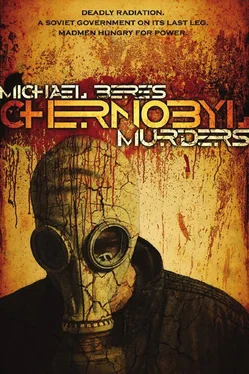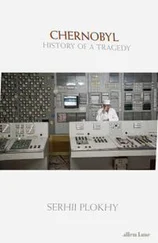Michael Beres - Chernobyl Murders
Здесь есть возможность читать онлайн «Michael Beres - Chernobyl Murders» весь текст электронной книги совершенно бесплатно (целиком полную версию без сокращений). В некоторых случаях можно слушать аудио, скачать через торрент в формате fb2 и присутствует краткое содержание. Жанр: Триллер, на английском языке. Описание произведения, (предисловие) а так же отзывы посетителей доступны на портале библиотеки ЛибКат.
- Название:Chernobyl Murders
- Автор:
- Жанр:
- Год:неизвестен
- ISBN:нет данных
- Рейтинг книги:4 / 5. Голосов: 1
-
Избранное:Добавить в избранное
- Отзывы:
-
Ваша оценка:
- 80
- 1
- 2
- 3
- 4
- 5
Chernobyl Murders: краткое содержание, описание и аннотация
Предлагаем к чтению аннотацию, описание, краткое содержание или предисловие (зависит от того, что написал сам автор книги «Chernobyl Murders»). Если вы не нашли необходимую информацию о книге — напишите в комментариях, мы постараемся отыскать её.
Chernobyl Murders — читать онлайн бесплатно полную книгу (весь текст) целиком
Ниже представлен текст книги, разбитый по страницам. Система сохранения места последней прочитанной страницы, позволяет с удобством читать онлайн бесплатно книгу «Chernobyl Murders», без необходимости каждый раз заново искать на чём Вы остановились. Поставьте закладку, и сможете в любой момент перейти на страницу, на которой закончили чтение.
Интервал:
Закладка:
15
On Monday, April 28, over forty-eight hours after the explosion of Chernobyl’s unit four, news of the disaster finally made it to the outside world. Workers at a Swedish nuclear plant began setting off radiation alarms as they entered the facility. This resulted in quan-titative measurements of the atmosphere. Radiation levels fifteen times the normal level were present in the air being blown from the Soviet Union.
Lacking seismic data to indicate a nuclear test, Western scientists concluded an accidental release of radiation, perhaps from a nuclear reactor, had occurred somewhere in the western Soviet Union. When news services got hold of the radioactive-cloud story, ripples of news flowed back across the frontier by way of Radio Free Europe and Voice of America.
After obtaining the Zhiguli as his personal militia vehicle three years earlier, Lazlo installed inside the glove box a used Blaupunkt radio, which received shortwave frequencies along with local frequencies.
The radio provided welcome distraction during many nights on stakeout. Without his secret radio, he would have been forced to listen only to militia two-way broadcasts instead of the strings of Lakatos and other Hungarian Gypsy music broadcast each evening from Radio Budapest.
On his way to the Ministry of Energy Monday morning, Lazlo heard about the radiation cloud over Sweden on Radio Free Europe.
The station was easy enough to find, but it was difficult to offset the frequency enough to eliminate the whirring buzz saw of the Soviet jammer. After hearing the report of radioactivity originating in the western Soviet Union, Lazlo switched to Radio Moscow’s local frequency. No mention of the radioactive cloud or of the disaster at the Chernobyl plant, no mention of the hordes of people who had come from the north throughout the night.
While the man and woman commentators on Radio Moscow droned on about the agricultural and economic outlook, Lazlo wondered if he’d been assigned overnight at the roadblock to keep him out of the way. Hundreds had entered Kiev, giving names of relatives who would be expecting them. Thousands had been sent to the Selskaya collective farm, which was equipped to handle two hundred.
Lazlo arrived at the Ministry of Energy at seven thirty. He’d spent most of Sunday afternoon and the entire night at the roadblock. He was hoarse from shouting at his men and at Chernobyl refugees. A cleaning woman in the building lobby waited until Lazlo cleared his throat before telling him no one arrived until nine.
Lazlo drove to his apartment. He tried calling Pripyat again without luck. He washed his face, changed clothes, and made himself two boiled eggs and coffee. Tamara’s black nightgown still lay across his bed from the night before. He sat on the edge of the bed and lifted the gown. The gown retained Tamara’s fragrance, and Lazlo closed his eyes, caressing the gown to his face as if it were the silk edge of a child’s blanket.
Twenty-four hours earlier he had been in bed with Tamara, but now their night together and breakfast at the bakery seemed weeks ago. As he sat on the bed fondling Tamara’s nightgown, thoughts of Tamara were swept aside by intervening events: the interviews with two Chernobyl workers unable to give specifics about Mihaly, the inept deputy minister at the Ministry of Energy who said everything was under control, and, finally, the long night trying to communicate with terrified refugees. Twenty-four hours since he learned an accident had occurred at Chernobyl and still he knew nothing of Mihaly and Nina and the girls. Was it planned? Chkalov and Lysenko teaming up to keep him in the dark? Sending him to one particular roadblock so he would be unaware of the numerous firemen and militia sent north? Perhaps they’d been worried the Gypsy might have pulled out his old Makarov 9mm and…
Suddenly something tore at his face. He opened his eyes with a start, realizing he had begun to doze off. His bristly beard was snagged in Tamara’s gown. He placed the gown gently on the bed, got a cup of strong coffee from the stove, and went into the bathroom to shave.
The office of the minister of electric power looked like any other Party official office with the union flag and the requisite portrait of Lenin commanding the center of attention. There was also a portrait of Nikolai Ryzhkov, the Soviet prime minister, but none of Gorbachev, and Lazlo wondered about this.
Viktor Asimov’s head was thinner on top than on the bottom because of massive cheeks and jowls. He had an aloof look, reminding Lazlo of Brezhnev. If the smile was as false as it looked, perhaps he would soon wish Asimov was also dead and buried in the Kremlin.
Lazlo politely refused Asimov’s offer of coffee or tea and sat in one of the chairs facing the desk. The guest chair was lower than the one behind the desk.
“So,” said Asimov, “Deputy Minister Mishin informs me you were here yesterday. Is this an official visit from the Kiev militia?”
“No,” said Lazlo. “I want information about my relatives who live in Pripyat, and especially about my brother, an engineer at Chernobyl. After being at a roadblock all night and seeing the panic of thousands, I’m not prepared for the sort of dialogue I had with your deputy.”
“What sort of dialogue?” asked Asimov.
“Saying everything is under control,” said Lazlo. “Please fill me in as quickly as possible about what you know, Comrade Minister, because I am tired and impatient.”
Asimov stood and turned to the window. “Very well, Detective Horvath. I was simply trying to be civil. I’m afraid I have bad news.”
Asimov paused, continued standing with his back to Lazlo. “Your brother, Mihaly Horvath, senior reactor control engineer, was one of two engineers injured in an explosion at the Chernobyl Nuclear Facility early in the morning on Saturday, April 26. Both injured men worked in the control area of the disabled RBMK-1000 reactor and were airlifted to Moscow for treatment. I am saddened to inform you your brother died from his injuries Sunday, April 27.”
The morning sunlight through the window beyond Asimov lay across the floor on bloodred carpet. On the wall, Lenin gazed skyward while Ryzhkov scowled. Lazlo sensed he was in the office, then felt for a moment he was not in the office. An overwhelming sense of guilt assailed him. The image of the dying Gypsy became Mihaly, and he became his brother’s murderer. History and time meant nothing. Was he a detective in the Kiev militia? Was he a nineteen-year-old soldier? Or was he a farmer? Mihaly with him, neither of them ever having attended the university in Kiev, neither of them ever having left the farm to be here in hell where machines steal a man’s mind and body. Mihaly!
If only closing his eyes could take him to the wine cellar. If only he could see Mihaly dance the czardas in his red canvas sneakers made in Czechoslovakia. If only this were a drunken dream caused by too much wine. Mihaly!
“I’m sorry,” said Asimov, returning to his chair and staring down at his desk. “It must be terrible, one’s own brother, and a younger brother. I asked associates at Medium Machine Building and The Kurchatov Institute if they had further information, but they do not.”
“What about Mihaly’s wife and children?”
“When I found out about your brother, I personally contacted officials in the area. It was difficult getting information because of the unnecessary panic.”
“What’s happened to them?”
“They were flown out of the area and are being treated in a Moscow hospital. I’ve been unable, so far, to determine their condition.
If you check back later today, I might have more news.”
“How was he killed?”
“I repeat, Detective Horvath, there was an explosion. Two engineers were severely injured, one of them your brother.”
Читать дальшеИнтервал:
Закладка:
Похожие книги на «Chernobyl Murders»
Представляем Вашему вниманию похожие книги на «Chernobyl Murders» списком для выбора. Мы отобрали схожую по названию и смыслу литературу в надежде предоставить читателям больше вариантов отыскать новые, интересные, ещё непрочитанные произведения.
Обсуждение, отзывы о книге «Chernobyl Murders» и просто собственные мнения читателей. Оставьте ваши комментарии, напишите, что Вы думаете о произведении, его смысле или главных героях. Укажите что конкретно понравилось, а что нет, и почему Вы так считаете.












